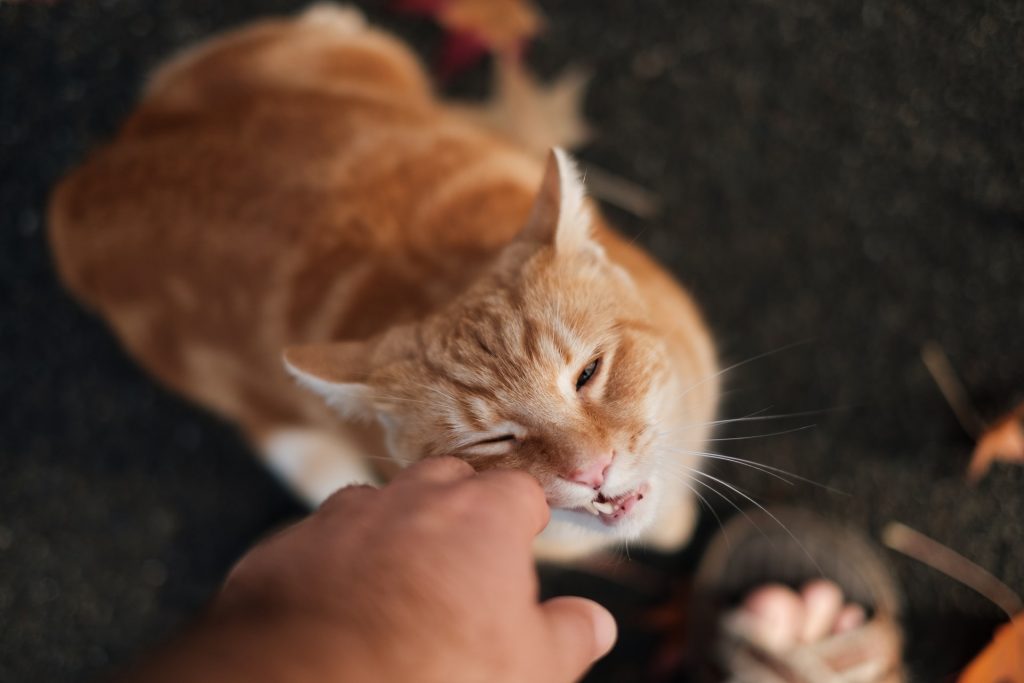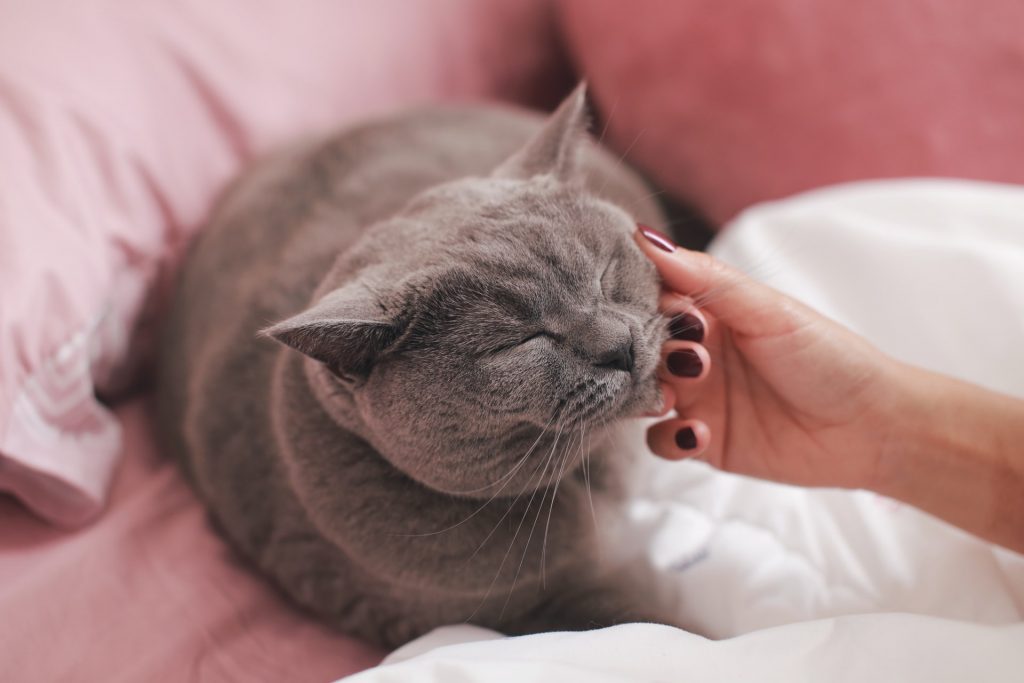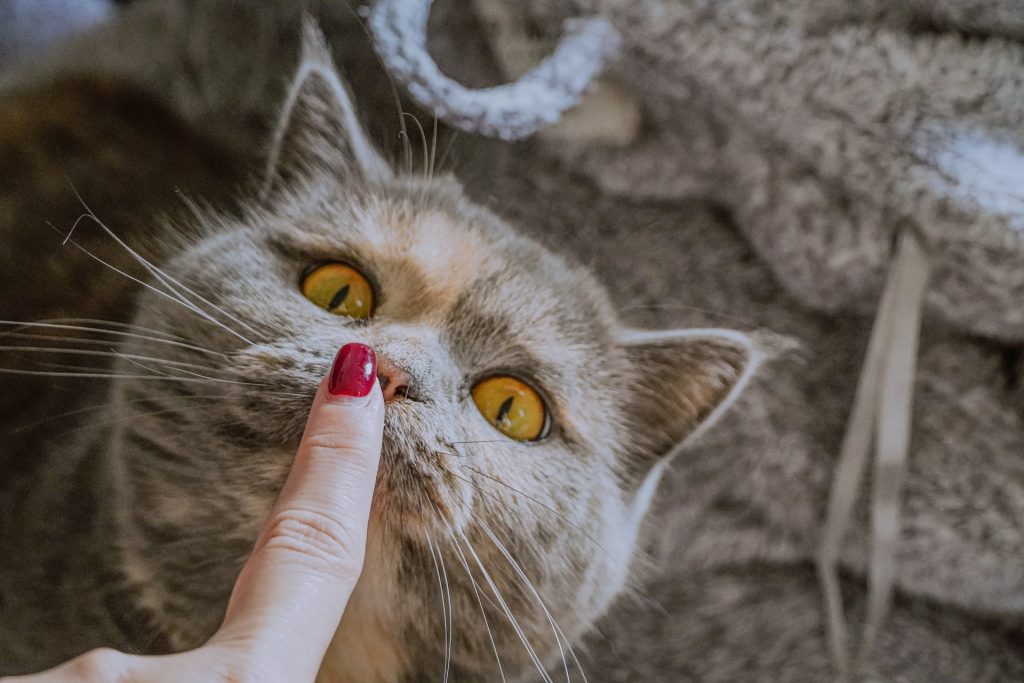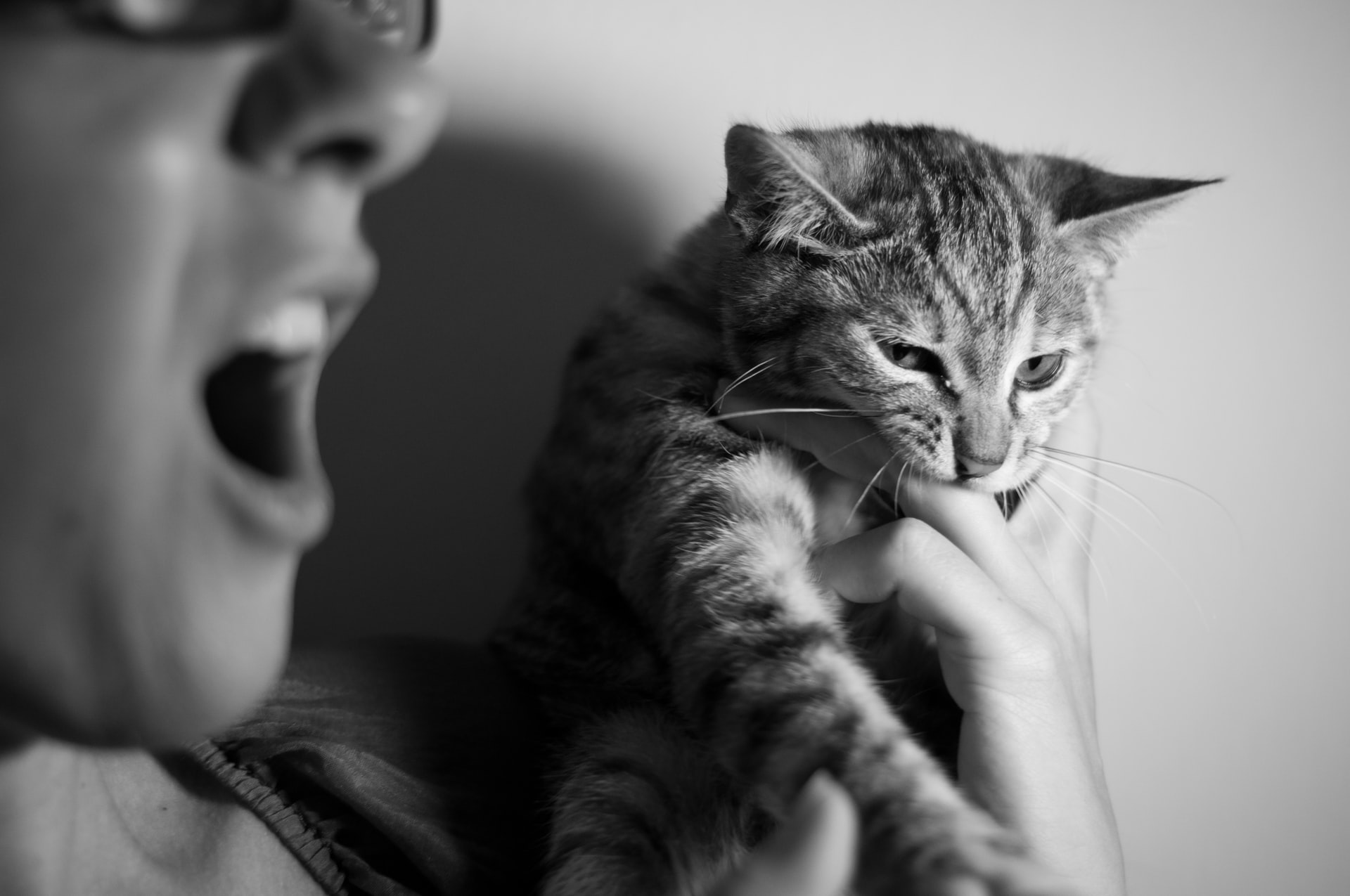“My cat keeps biting me for no reason, should I be worried?”
We often receive this question from newbie cat owners. Don’t worry because this is pretty normal among felines. My cat does this to me as well, and I somehow got used to the bite marks on my hand. While most biting cases are playful and affectionate, you should also watch out for some problematic tendencies.
My cat keeps biting me for no reason, what’s causing it?

Biting among cats can be due to a lot of reasons. Remember that biting isn’t always a sign of aggression or a behavioral problem. Since cats can’t talk, your pet will use biting to communicate something. It could be any of the following:
Your cat wants to play
Many cats bite to initiate playtime. Usually, it will be a gentle nip, after which your cat will lead you to a toy. This is a sign that your cat wants you to do something. If not sufficed, your cat may nip you repeatedly. Some kitties would meow loudly to let their demands be known.
In this case, your cat uses biting to get your attention. Aside from playtime, your cat might be hungry, wants to be petted, or not feeling well. The gesture that follows the bite will let you know what your cat wants.
Your cat is over-stimulated
Does your cat bite you in the middle of petting? If so, it means that your cat is over-stimulated. Even if your pet loves it at first, they will nip on your hand to let you know that you should stop. Cats will do the same if your petting gets rough or if you’re already hurting them.
If your cat bites you when petting their chest, it might be a sign to move to their faces, paws, or heads. This is a normal reaction and must not be punished.

Your cat is in fight mode
Even if your cat is usually gentler, it can be in ‘fight mode’ if they are stressed or frightened. Like humans, cats can be overcome by emotions, too.
For example, the loud sound of a vacuum cleaner can tick the attack switch on your cat. The kitty may try to bite the appliance, and in the stir of confusion, it may bite you as well.
This is called redirected fear. For those with nervous cats, this reaction can be difficult to control and reduce. The only way to prevent this from happening is to eliminate the triggers in the environment.
Once your cat is in attack mode, they may bite hard to the point of drawing blood. Never punish your cat because the pet may think that you are in for a fight. Remember that cats don’t have the same reasoning as humans.
Your cat is in the teething phase
Like dogs, cats will also go through the teething phase. A teething kitten will have an increased urge for chewing and biting. The little feline will target your plump toes and fingers.
Cat teething will usually take place in the first six weeks of your kitten’s life. This wouldn’t be a problem for you since most kittens are handed to owners at the 10th or 12th week of life.
However, the teething problem will recur at three months of age. At this point, your cat’s milk teeth will fall off to be replaced by adult fangs. During this phase, your cat will bite and chew to appease their flaring gums. Unfortunately, your body is one of the best and most convenient choices.
You can redirect this behavior by providing soft chew toys to your kitten. You should also consult with the vet to check if the teeth are growing properly.
Your cat is sick
Medical conditions also have a connection to your cat’s biting habits. You may be touching their painful body part. Senior cats with arthritis are highly prone to sickness-related biting.
In rare cases, cats will bite out of pain due to Feline Hyperesthesia Syndrome. This condition causes sudden, odd, and alarming episodes among cats. It’s also called skin rolling, where your cat’s skin becomes extremely sensitive. During an episode, your cat will feel extreme pain from gentle petting. They may lash out in pain and bite you as an effort to stop the pain.
Feline Hyperesthesia Syndrome symptoms include unexplained aggression, intense vocalization, dilated pupils, incontinence, constant and excessive grooming, and tail mutilation. You should seek a veterinarian’s help if you suspect that your cat is suffering from this condition.
When should you worry about biting?
If your cat is giving love bites, there’s nothing to worry about. You can still reduce the behavior, so your pet won’t try to cross the line someday.
However, if the biting is accompanied by signs of aggression and unexplained behavior, it’s best to consult with the veterinarian. Although medical conditions rarely cause biting, a proper examination will rule out the possibility.
Remember that cats develop the habit of biting because you reward it, one way or another.
Did your cat bite you hard that resulted in an open wound? In this video, an expert from The Mayo Clinic warns about potential infections:
How to reduce cat biting
If your cat’s biting habit is starting to be hurtful and annoying, you can do something to discourage the behavior. I recommend the following tips:
Stop offering your hands or feet
The problem with a lot of pet owners (I was once guilty of this too) is that they offer their hands to their cat. The cat will then think that biting and nibbling is acceptable behavior. And since cats don’t have the same logic as humans, they may bite harder than you can tolerate.
The first step to discouraging this is to stop triggering the behavior. This includes nibbling on your clothes. If your cat tries to get your hand or clothes to chew, say a firm ‘no’ then keep your distance.
Consistency is a must here, so your cat will learn the new rule. Giving in to your cat’s biting habits will give the kitty more courage to defy your commands in the future.
Consider neutering
If the biting is becoming more aggressive over time, you should consider neutering your cat. This is the best solution if your male cat is starting to draw blood on their playful bites.
Neutering will help your cat calm down. While there’s no guarantee that it will stop the biting, it will reduce the pet’s aggressive tendencies. It’s beneficial for your cat in general. Neutering is also advisable if you don’t want your cat to get pregnant or impregnate another cat.
To know if your cat is healthy enough for neutering, you should consult the vet first. Most of the time, the veterinarian will run a blood test to spot any health conditions that need to be treated prior to the procedure.
Don’t reward the biting
You may not know it yet, but you’re likely rewarding the biting behavior of your cat. The simple gesture of offering your hands affirms the habit.
However, you shouldn’t punish your cat either. If your cat stops biting upon command, you should reward it with a treat. If the cat didn’t follow, remove your hand and walk away. In this setup, your cat gets a reward for stopping the behavior. However, defying, you will get them nothing, which is a kind of punishment by itself.
Training your cat will help a lot in discouraging the biting habit. Again, consistency is key if you want your cat to recall commands.

Use Bitter Apple
If the biting doesn’t stop after performing the steps above, you can use Bitter Apple instead. This is a chew and biting deterrent for both cats and dogs. It’s a safe and edible formula, but it has a bitter taste that your cat will find repulsive.
Usually, Bitter Apple is used to stop fur biting and excessive grooming. You can also find a formula that’s safe to apply directly to human skin. You can apply some on the spots your cat loves chewing. Over time, your kitty will associate the bitter taste to your body, and it will stop biting.
Bitter Apple can be applied to furniture and other household items as well.
One of the most trusted Bitter Apple product is Grannick’s. It comes in 8-ounce spray bottles and can be applied on almost any surface. This formula will not damage upholstery, which is a big plus. If you’re planning to buy a different Bitter Apple brand, make sure that it’s safe for cats.
Frequently Asked Questions
Q: Is it okay to spray my cat with water to deter biting?
A: A lot of cat owners use water spraying as a method to deter a specific behavior of their cats. However, cats see this as a punishment, which may lead to more aggressive tendencies. Remember that cats don’t forgive any form of abuse or harm. Once they tagged for you something hurtful or unpleasant, the kitties will not trust you anymore.
Q: What cat breed doesn’t fight?
A: Basically, all cats will bite if they are placed on a stressful or frightening condition. Still, some cat breeds are friendlier and less likely to cause harm to their owners. Some of these breeds are Persian, Exotic Shorthair, Abyssinian, and Burmese cats. Take note that these kitties will still bite under specific conditions and, if triggered to do so.
Q: Do male cats bite less than female cats?
A: The gender of your cat doesn’t really have a solid connection to their biting tendencies. The situation and other factors affect this behavior. Nevertheless, females are more loving and physically affectionate than males, so they are likely to give some love bites. Male cats can do this too.
Q: Is hard biting a form of aggression among cats?
A: Love bites don’t usually draw blood, but if your cat crossed the line and bites you hard, you must stop playtime or any form of engagement right away. This will let your cat know that the hard bite is unacceptable behavior.
Q: How will I know if my cat is play biting?
A: Play biting is usually characterized by small and light nipping. Your cat’s teeth shouldn’t bury on the skin. If it did, you must stop playtime. Your cat might be thinking that rough play is acceptable.
Q: Will Bad Apple smell bad when sprayed at home?
A: For humans, Bitter Apple has a very mild scent that’s hard to detect. It’s the taste that will deliver the magic. If you’re using it on household items, you can re-apply after a couple of days. When used on the skin, a small amount will go a long way.
Final words
“My cat keeps biting me for no reason!” If you’re also dealing with this problem, there are workarounds that you can try at home. In some cases, the help of a veterinarian will also come handy.

